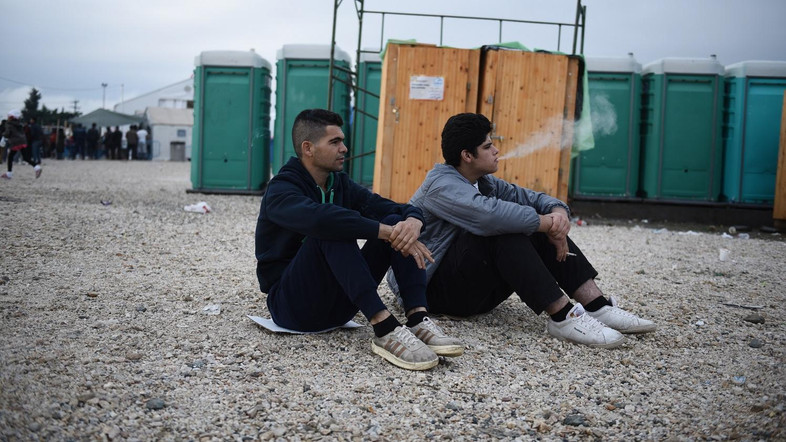Athena, 19 Rabi’ul Akhir 1437/29 January 2016 (MINA) – Dazzled by an unprecedented wave of migration, Sweden on Thursday put into words an uncomfortable reality for Europe, If the continent isn’t going to welcome more than 1 million people a year, it will have to deport large numbers of them to countries plagued by social unrest and abject poverty.
Interior Minister Anders Ygeman said Sweden could send back 60,000-80,000 asylum seekers in the coming years. Even in a country with a long history of immigration, that would be a scale of expulsions unseen before, Al Arabiya News quoted by Mi’raj Islamic News Agency (MINA) as reporting.
“The first step is to ensure voluntary returns,” Ygeman told Swedish newspaper Dagens Industri. “But if we don’t succeed, we need to have returns by coercion.”
The coercive part is where it gets uncomfortable. Packing unwilling migrants and refugees, even entire families, onto chartered airplanes bound for the Balkans, the Middle East or Africa evokes images that clash with Europe’s humanitarian ideals.
Also Read: Spain to Take Israel to ICC Over Global Sumud Flotilla ‘Hijacking’
But the sharp rise of people seeking asylum in Europe last year almost certainly will also lead to much higher numbers of rejections and deportations.
European Union officials have urged member countries to quickly send back those who don’t qualify for asylum so that Europe’s welcome can be focused on those who do, such as people fleeing the war in Syria.
“People who do not have a right to stay in the European Union need to be returned home,” said Natasha Bertaud, a spokeswoman for the EU’s executive Commission.
“This is a matter of credibility that we do return these people, because you don’t want to give the impression of course that Europe is an open door,” she said.
Also Read: After Release, Greta Thunberg Urges World Not to Look Away from Gaza
Not refugees
EU statistics show most of those rejected come from the Balkans including Albania and Kosovo, some of Europe’s poorest countries. Many applicants running away from poverty in West Africa, Pakistan and Bangladesh also are turned away. Even people from unstable countries like Iraq, Afghanistan and Somalia can’t count on getting asylum unless they can prove they, personally, face grave risks at home.
Frans Timmermans, the Commission’s vice president, told Dutch TV station NOS this week that the majority of people seeking asylum in Europe are not refugees.
Also Read: Dutch Medical Association Nominates Dr. Hussam Abu Safiya for Nobel Peace Prize
“More than half, 60 percent, should have to return much more quickly. If we start with doing that, it would already make a huge difference,” he said.
Sending them back is easier said than done. In 2014, EU nations returned less than 40 percent of the people who were ordered to be deported.
Sometimes those seeking asylum go into hiding after receiving a negative decision. Sometimes their native country doesn’t want them back.
EU countries, including Sweden and Germany, have had some success sending people back to the Balkans on chartered flights. Of the 37,000 who returned from Germany on their own accord last year, all but about 5,000 were from the Balkans.
Also Read: Italian MEP Describes Mistreatment by Israel After Joining Gaza Aid Flotilla
“It’s been more difficult with Iraq and Afghanistan,” said Mikael Ribbenvik, director of operations at the Swedish Migration Agency. “The returns have worked during some periods, and not so well during others.”
One of the biggest obstacles to sending people back is to obtain travel documents from their home countries. People routinely lose or even destroy their travel papers coming to Europe, creating confusion about where they are from.
“Most countries in the world don’t accept someone if cannot be proved that it’s one of their citizens,” Ribbenvik said.
Sweden has urged the EU and its Frontex border agency to help establish return agreements with the countries of origin.
Also Read: Greta Thunberg Condemns Gaza Genocide After Release from Israeli Detention
Frontex’s budget for deporting people was significantly increased this year, allowing it to coordinate more flights and help countries prepare their own.
Under U.N. rules, countries are supposed to offer protection to refugees fleeing war and persecution. But some European countries also offer protection to people deemed at risk of torture or the death penalty or who are suffering from an exceptionally serious disease.
Even for those who get a negative decision within months, it can take years before all appeals are exhausted and they are ordered to leave.
Jawad Aref Hashemi, a 43-year-old Afghan who lived in Iran before traveling to Denmark to seek asylum, suggested he won’t accept no for an answer.
Also Read: Israel Frees All Spanish Flotilla Activists Except One
“If people are sent home, they will protest. How will they send us home? In big cars? We are not animals,” he said. (T/P006/R07)
Mi’raj Islamic News Agency (MINA)
Also Read: Swedish FM Deems Reports of Thunberg’s Abuse in Israel ‘Very Serious’



































 Mina Indonesia
Mina Indonesia Mina Arabic
Mina Arabic